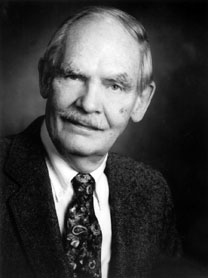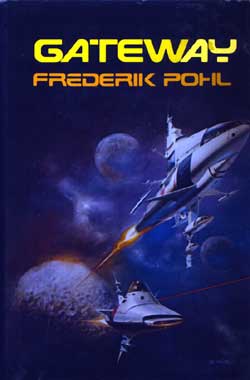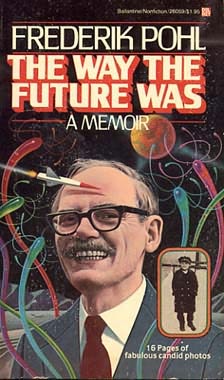I have a theory. I think that when a reader--a passionate reader--has been a fan of a particular writer for a long time...I'm talking about decades, he or she might mourn more than if it were an actor. Or an athlete. A director or an artist. Especially when the writer in question has been prolific in both fiction and nonfiction. We have been in the writer's head. Intimately. It's almost as if the brain waves of the writer were transported into the longtime reader's own mind.
2013 has been a terrible year for readers. Especially genre readers. We have sustained so many losses. Richard Matheson. Rick Hautala. James Herbert. Jack Vance. Elmore Leonard. David B. Silva. I'm sure there have been others, but these names come painfully to mind right away.
And now we have lost the incomparable Frederik Pohl. The above names are all legends, and each of them mean the world to me. But Frederik Pohl? This one hurts most of all.
I'm hardly the first one to say this, but Pohl has been just about everything imaginable in the science fiction field: Fan, agent, editor, novelist, short story writer, essayist, poet, lecturer.
 Somehow Frederik Pohl never made the transition from genre heavyweight to the bestseller list. He might have had some things up there, but he certainly never attained the breakthrough recognition as the so-called "Big Three" did. This is definitely not because he was not their equal as a writer. It is arguable that he was more consistent with quality fiction than any of those guys.
Somehow Frederik Pohl never made the transition from genre heavyweight to the bestseller list. He might have had some things up there, but he certainly never attained the breakthrough recognition as the so-called "Big Three" did. This is definitely not because he was not their equal as a writer. It is arguable that he was more consistent with quality fiction than any of those guys.
I talk to people who are SF readers from time to time. Few seem to have even heard of Frederik Pohl. That is such a goddamn shame. Pohl was one of the most influential figures in the history of the field.
Pohl was there at the beginning. First Fandom. There with all the feuds and festivity of the very first science fiction convention. As an organizer of the event, Frederik Pohl helped pave the way for future cons like World Horror, NECON, Chiller, Comic-Con, all of them.
In his teen years he was one of the founders of the writing group, The Futurians. Over the years the club had members like Isaac Asimov, James Blish, Donald Wollheim, C.M. Kornbluth, and many others. These individuals become some of the biggest names in the history of the SF genre. Damon Knight wrote a book about the group, called appropriately enough, The Futurians. I cannot recommend it highly enough. It is informative, entertaining, hysterically funny, and a little sad.
He began his long career in publishing in 1937, with a poem called Elegy to a Dead Satellite: Luna. In 1939 Pohl stumbled into the position of editing not one, but two, SF magazines: Astonishing Stories, and Super Science Stories. These were second-rate periodicals, but they were learning ground for his editorial skills.
Pohl wrote and sold stories regularly. He would fill the pages of his magazines with his own fiction at times, usually under a pen name. All told he used nearly a dozen pseudonyms in his career.
He tried his hand at being a literary agent, representing among other writers, Isaac Asimov. This venture did not prove to be lucrative, and he returned to writing and editing.
In the 1950's, Frederik Pohl took over the reigns of Galaxy Magazine, and its sister publication, Worlds of If. In this time he became one of the most important editors in the history of the field, winning numerous awards for the quality of the fiction he acquired for them.
Pohl was a prolific writer all through these periods. He wrote and published under his own solo byline, but also collaborated with other writers, most notably C.M. Kornbluth. The two authors were responsible for one of the most enduring classics of the time, The Merchants of Space. Pohl also wrote with Jack Williamson and Lester del Ray. Much later he helped Arthur C. Clarke with The Last Theorem.
The fiction of Frederik Pohl was often acidly satirical. A frequent target of his was consumerism and corruption in advertising.
Frederik Pohl became an established novelist, but after 1965's The Age of the Pussyfoot, it was over a decade until another one came out under his name. 1976 saw the publication of Man Plus, and while his early work was notable, with this one he emerged as one of the finest talents in the genre. It won the Hugo, the Nebula, and the John W. Campbell Memorial Award. But that was only the beginning...
Gateway, by Frederik Pohl, was published he following year, in 1977. It was a revelation and it took science fiction as a literary art to new heights. Not as preachy as Heinlein's counterculture hit, Stranger in a Strange Land, nor as befuddling as Clarke's 2001, Gateway contained elements of the sexual revolution, and recreational drug use was present.
Gateway is the captivating story of an everyman who wins a chance to earn a fortune, or lose his life, in a space jaunt courtesy of an ancient race called The Heechee. The novel is rich in humor and sociological observations, as well as the trappings of the SF genre that readers craved. Once again Pohl swept the major awards. For the second consecutive year. Gateway won the Hugo, the Nebula, and the John W. Campbell Memorial Award. It also spawned five sequels and a tribute anthology. Gateway makes the very short list of greatest science fiction novels of all time. If you have not read it, you should. Posthaste.
Pohl continued to write outstanding fiction. Novels like JEM, Stardust, The Cool War, The Day the Martians Came, and many others. His 1986 short story, Fermi and Frost, was the Hugo winner of that year.
I also highly recommend Pohl's autobiography, The Way the Future Was. It is not only the story of his life up to 1978, but the book also serves as a history of the science fiction fiction genre. From a guy who was there every step of the way.
 Oh, and I almost neglected to mention his marvelous anthologies. Pohl edited many of them, but the best of the lot were the Star Science Fiction Stories books that he edited. These contained all original stories and were the SF equivalent of horror anthology series' like Shadows, Borderlands, and Shivers.
Oh, and I almost neglected to mention his marvelous anthologies. Pohl edited many of them, but the best of the lot were the Star Science Fiction Stories books that he edited. These contained all original stories and were the SF equivalent of horror anthology series' like Shadows, Borderlands, and Shivers.
Frederik Pohl won his final Hugo Award in 2010 for, of all things, Best Fan Writer. This was bestowed upon him for his online webpage, The Way the Future Blogs.
On September 13th, 2013, at the venerable age of 93, Frederik Pohl departed this world.
People in the know love and respect the work of Frederik Pohl. Too many others, George Lucas bootlickers especially, know nothing of it. Even though Pohl's work as a writer and an editor influenced virtually everything that has been watched or read in the science fiction genre.
For me Frederik Pohl was as a God on Olympus. Casting spells down upon mortals and shaping the lives and events beneath him. The has never been anyone like him, and there never will be anyone like him again.
2013 has been a terrible year for readers. Especially genre readers. We have sustained so many losses. Richard Matheson. Rick Hautala. James Herbert. Jack Vance. Elmore Leonard. David B. Silva. I'm sure there have been others, but these names come painfully to mind right away.
And now we have lost the incomparable Frederik Pohl. The above names are all legends, and each of them mean the world to me. But Frederik Pohl? This one hurts most of all.
I'm hardly the first one to say this, but Pohl has been just about everything imaginable in the science fiction field: Fan, agent, editor, novelist, short story writer, essayist, poet, lecturer.
 Somehow Frederik Pohl never made the transition from genre heavyweight to the bestseller list. He might have had some things up there, but he certainly never attained the breakthrough recognition as the so-called "Big Three" did. This is definitely not because he was not their equal as a writer. It is arguable that he was more consistent with quality fiction than any of those guys.
Somehow Frederik Pohl never made the transition from genre heavyweight to the bestseller list. He might have had some things up there, but he certainly never attained the breakthrough recognition as the so-called "Big Three" did. This is definitely not because he was not their equal as a writer. It is arguable that he was more consistent with quality fiction than any of those guys.I talk to people who are SF readers from time to time. Few seem to have even heard of Frederik Pohl. That is such a goddamn shame. Pohl was one of the most influential figures in the history of the field.
Pohl was there at the beginning. First Fandom. There with all the feuds and festivity of the very first science fiction convention. As an organizer of the event, Frederik Pohl helped pave the way for future cons like World Horror, NECON, Chiller, Comic-Con, all of them.
In his teen years he was one of the founders of the writing group, The Futurians. Over the years the club had members like Isaac Asimov, James Blish, Donald Wollheim, C.M. Kornbluth, and many others. These individuals become some of the biggest names in the history of the SF genre. Damon Knight wrote a book about the group, called appropriately enough, The Futurians. I cannot recommend it highly enough. It is informative, entertaining, hysterically funny, and a little sad.
He began his long career in publishing in 1937, with a poem called Elegy to a Dead Satellite: Luna. In 1939 Pohl stumbled into the position of editing not one, but two, SF magazines: Astonishing Stories, and Super Science Stories. These were second-rate periodicals, but they were learning ground for his editorial skills.
Pohl wrote and sold stories regularly. He would fill the pages of his magazines with his own fiction at times, usually under a pen name. All told he used nearly a dozen pseudonyms in his career.
He tried his hand at being a literary agent, representing among other writers, Isaac Asimov. This venture did not prove to be lucrative, and he returned to writing and editing.
In the 1950's, Frederik Pohl took over the reigns of Galaxy Magazine, and its sister publication, Worlds of If. In this time he became one of the most important editors in the history of the field, winning numerous awards for the quality of the fiction he acquired for them.
Pohl was a prolific writer all through these periods. He wrote and published under his own solo byline, but also collaborated with other writers, most notably C.M. Kornbluth. The two authors were responsible for one of the most enduring classics of the time, The Merchants of Space. Pohl also wrote with Jack Williamson and Lester del Ray. Much later he helped Arthur C. Clarke with The Last Theorem.
The fiction of Frederik Pohl was often acidly satirical. A frequent target of his was consumerism and corruption in advertising.
Frederik Pohl became an established novelist, but after 1965's The Age of the Pussyfoot, it was over a decade until another one came out under his name. 1976 saw the publication of Man Plus, and while his early work was notable, with this one he emerged as one of the finest talents in the genre. It won the Hugo, the Nebula, and the John W. Campbell Memorial Award. But that was only the beginning...

Gateway, by Frederik Pohl, was published he following year, in 1977. It was a revelation and it took science fiction as a literary art to new heights. Not as preachy as Heinlein's counterculture hit, Stranger in a Strange Land, nor as befuddling as Clarke's 2001, Gateway contained elements of the sexual revolution, and recreational drug use was present.
Gateway is the captivating story of an everyman who wins a chance to earn a fortune, or lose his life, in a space jaunt courtesy of an ancient race called The Heechee. The novel is rich in humor and sociological observations, as well as the trappings of the SF genre that readers craved. Once again Pohl swept the major awards. For the second consecutive year. Gateway won the Hugo, the Nebula, and the John W. Campbell Memorial Award. It also spawned five sequels and a tribute anthology. Gateway makes the very short list of greatest science fiction novels of all time. If you have not read it, you should. Posthaste.
Pohl continued to write outstanding fiction. Novels like JEM, Stardust, The Cool War, The Day the Martians Came, and many others. His 1986 short story, Fermi and Frost, was the Hugo winner of that year.
I also highly recommend Pohl's autobiography, The Way the Future Was. It is not only the story of his life up to 1978, but the book also serves as a history of the science fiction fiction genre. From a guy who was there every step of the way.
 Oh, and I almost neglected to mention his marvelous anthologies. Pohl edited many of them, but the best of the lot were the Star Science Fiction Stories books that he edited. These contained all original stories and were the SF equivalent of horror anthology series' like Shadows, Borderlands, and Shivers.
Oh, and I almost neglected to mention his marvelous anthologies. Pohl edited many of them, but the best of the lot were the Star Science Fiction Stories books that he edited. These contained all original stories and were the SF equivalent of horror anthology series' like Shadows, Borderlands, and Shivers.Frederik Pohl won his final Hugo Award in 2010 for, of all things, Best Fan Writer. This was bestowed upon him for his online webpage, The Way the Future Blogs.
On September 13th, 2013, at the venerable age of 93, Frederik Pohl departed this world.
People in the know love and respect the work of Frederik Pohl. Too many others, George Lucas bootlickers especially, know nothing of it. Even though Pohl's work as a writer and an editor influenced virtually everything that has been watched or read in the science fiction genre.
For me Frederik Pohl was as a God on Olympus. Casting spells down upon mortals and shaping the lives and events beneath him. The has never been anyone like him, and there never will be anyone like him again.
The author does not allow comments to this entry
No comments